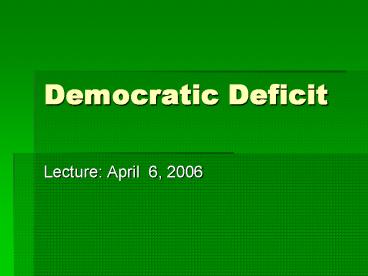Democratic Deficit - PowerPoint PPT Presentation
1 / 15
Title:
Democratic Deficit
Description:
Increase in executive power and decrease in national parliamentary control ... easy access to policy related documents (i.e. white and green papers) ... – PowerPoint PPT presentation
Number of Views:213
Avg rating:3.0/5.0
Title: Democratic Deficit
1
Democratic Deficit
- Lecture April 6, 2006
2
(No Transcript)
3
(No Transcript)
4
(No Transcript)
5
Democracy
??µ???at?a
d?µ?? deimos the people
??at?a kratia the rule
6
The three basic aspects of the EU democratic
deficit
- The relation between
- 1. the European People and the EU Institutions
- 2. the Member States and the EU Institutions
- 3. the European Parliament and the other EU
Institutions
7
The Standard Version of the critique of
democracy in Europe (Weiler et. al.)
1. Increase in executive power and decrease in
national parliamentary control
- The European Parliament is too weak
3. The European Parliament is too remote
8
4. No real European elections
5. Weakening of diffuse and fragmented national
interest groups
6. Anti-majoritarian policy drift
7. Overall lack of transparancy
9
Democracy without a demos?
Weiler et al demos is the basis for a democratic
polity
EU lacks authority and legitimacy of a democratic
state
Solution
Emergence of a European demos
Cooperation through international treaties
10
Inverted regionalism
1. Transfer of government functions from the
members states to the EU
2. Micromanagement
3. No effective limit to the extension of
competences
overall weakening of national parliaments as
public forums
11
The DefenceMoravcsik Majone
little evidence that the EU suffers from a
fundamental democratic deficit
Critique results from privileging the abstract
over the concrete (issue of standards)
EU decision making procedures are very much in
line with general practice of most modern
democracies
12
1. EU decision-making processes are dominated by
national governments
They are the most directly accountable
politicians in Europe
2. Significant increase of the powers of the
European Parliament
veto-power over selection of commission
Legislation under the co-decision procedure must
be approved by the European parliament
13
3. EU policy-making process is more transparent
than most domestic systems
easy access to policy related documents (i.e.
white and green papers)
Extensive participation and consultation of the
public prior to legislative actions
Extensive judicial review by ECJ and National
Courts
14
4. Re European elections
EU policy topics not salient enough for voters to
take interest
EU policy making is and should be largely
insolated from majoritarian contests
the EU may be more representative precisely
because it is, in a narrow sense, less
democratic Moravcsik
15
5. The treaties ensure consensus based
decision-making
6. The Union promotes the access of diffuse
interests to the legislative process
7. The EU is regulatory in nature rather than
redistributive Discussed Problems are rather
problems of credibility than of democratic
deficit (Majone)































